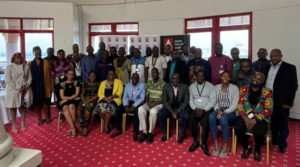 The Kenya Pipeline Company (KPC) paid special recognition to 29 staff members who led the integration of the industry acclaimed SAP Oil and Gas (SAP IS Oil) system with Kenya Revenue Authority’s (KRA) Integrated Customs Management Systems (ICMS).
The Kenya Pipeline Company (KPC) paid special recognition to 29 staff members who led the integration of the industry acclaimed SAP Oil and Gas (SAP IS Oil) system with Kenya Revenue Authority’s (KRA) Integrated Customs Management Systems (ICMS).
The system is instrumental for cargo clearance from importation, storage, and distribution to the final retail destination.
The State agency tasked with the responsibility of transporting and delivering oil products in the country was led at the occasion by Pius Mwendwa who is in charge of Finance at KPC and Robin Lokoyan the project lead.
The main objective of the integration is to improve efficiency and tax compliance. The benefits of the integration process include increased efficiency in loading processes due to minimal human interruptions, reduced paperwork, increased transparency, increased customer satisfaction, improved tax compliance in addition to reduced risk of product being lifted without KRA entries.
Implementing such projects are some of the innovative things KPC does to so that it can remain one of the profitable and reputable state-owned enterprise.
“I am proud of this team, your dedication and prowess in handling phase one of this project was exceptionable” said a jovial Dr. Macharia when appreciating the team members during a breakfast meeting at Kenpipe Plaza.
The team was also awarded commendation letters for their work. The project was implemented inhouse was in two phases with phase one involving KPC online order processing and phase two, integration of SAP ERP and ICMS.
A successful Go-Live of Phase I – online order processing, that has seen remarkable improvement in the evacuation of product from the depots.
Evacuation of petroleum products in the KPC Western Kenya loading depots of Kisumu, Eldoret and Nakuru has greatly improved; thanks to the SAP systems integration between KPC and KRA.
The project team will now embark on Phase two. This commendation took place in tandem with The Ministry of National Treasury and Planning mentioning Kenya Pipeline as one of the state-owned enterprises that is profitable together with Kenya Airports Authority, KenGen and Kenya Ports Authority.
The ministry highlighted its ongoing efforts towards developing a national strategy to improve the governance and financial oversight, as well as address the debt vulnerabilities of state corporations as outlined in the 2013 Presidential Taskforce Report on Parastatal Reforms.



